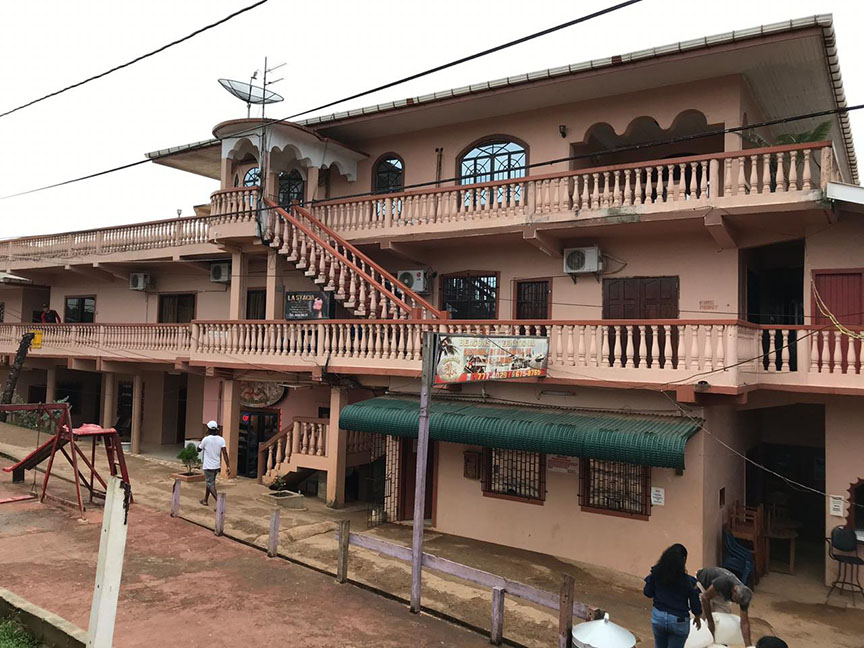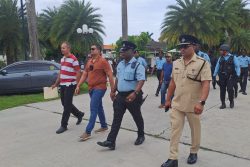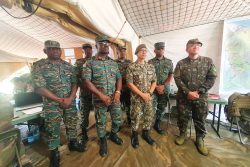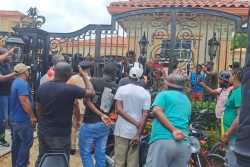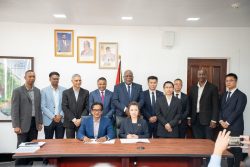The crisis in neighbouring Venezuela continues to force its nationals to flee from economic hardship and communities in proximity such as Port Kaituma have registered an influx of nationals in search of jobs, medical aid and food.
Since their arrival in the North West community, residents related that there has been a rapid rise in prostitution. Many believe the women are involved in the trade as a means of survival, not only for them, but for their families.
Close to 130 persons would have registered their arrival in Port Kaituma but officials of the community and the police believe the number of those arriving is higher. Stabroek News was told that many arrive in the community but would not register themselves with the police or just pass through the community and make their way to the gold mining backdams.
The majority of the Venezuelans arriving in the community are females, Neighbourhood Democratic Council (NDC) Chairman, Orlando Thorne, said.
He however pointed out that while the migrants are flowing into the community, they are not staying permanently.
“We started noticing them about a year ago…they work a bit and then go back. A set this month and a different set another time. They would just spend a two weeks or a month and then move on. We would see new faces here often. Either they go to the backdam or return home after they have managed to save up some money,” he explained.
Nonetheless, the community has noticed a few returning migrants bringing their families.
Thorne explained to this newspaper that they first noticed Venezuelans in the community about a year ago and within the last few months, families have been moving into the community.
“We don’t have an immigration office set up here so we don’t know much people are actually coming. Most of them have come across with boats. There is an immigration office at Morawhanna but I cannot comment on how much of these Venezuelans would stop there. But we don’t have a record at the NDC level,” the chairman said.
Most of the fleeing nationals would occupy rooms at hotels and guest houses in the community. Some would seek employment as domestic workers at the hotels and other businesses places in the community, while others engage in the sex trade.
“Prostitution is very dominant here. They have a specific bar they would be at through the `Crack’ [a populated alley with clubs, hotels, and eateries in central Port Kaituma]. They would share a room and the women would work at nights…the men who come with them don’t work,” the chairman disclosed before explaining that the actions of the women are a means of survival.
“We do not have jobs here, so even if they wanted to work we don’t have jobs for them. They work and go back after saving some money,” he said.
A resident who asked not to be named told Stabroek News, “The women are mainly involved in prostitution. They are coming to work and send money home to their families and have access to medical care.”
Like the chairman, he too pointed out that most of the soliciting of sexual acts would take place at the nightclubs and bars.
“We cannot chase the people them away. With them comes business for the hotel and guest house owners. But we need to keep monitoring their activities because we do not know who is among us,” the resident pointed out.
Labour at a cheaper cost
A businessman told Stabroek News that they are employing Venezuelan nationals because they are providing labour at a cheaper cost. He noted that he has employed a few and they are working at his mining operations in the backdam.
Asked about his thoughts on the influx of the foreigners, he said “it looks like a reverse of the situation of when Guyana was in crisis. Was just a single person coming but like four months ago I saw the families coming with children.”
One of the hotel operators explained to Stabroek News that with her rooms ranging from $3000 to $8000 per night, the majority of the Venezuelans use her hotel. She noted that she employs approximately four persons as labourers and cleaners. A mother and son has been working with her for approximately a year providing domestic services.
The operator said, while she never had any issue with employing Spanish-speaking workers, the language difference poses some challenges and prevents them from communicating effectively.
“The language barrier is a challenge to everyone here because we cannot talk to them. A few people know Spanish and are able to communicate with them,” she said.
Asked about the accommodations she provides, the operator explained that approximately four persons would share a room. The woman also noted that in many instances, before a group leaves another would arrive and book into the rooms.
“They would have their friends coming before they leave and taking the room. There is a demand for rooms so like when a set is going another set would come in and take the rooms,” she said.
“We don’t have an issue with them paying but we suffer losses. Sometimes they take away your sheets or towels. Sometimes they destroy your mattresses and we will only see this when they leave,” she lamented when asked about the challenges she faces.
While speaking to Stabroek News, the operator also pointed out that most of the young females would be involved in prostitution to earn money. She however said during the weekends it is more evident. On weekends most porknockers would visit the community and party.
Additionally, the resident called on the government to establish an immigration department in the community and improve security as a precautionary measure.
“In the community we are having too much people coming and we don’t have proper security to deal with them. We don’t know who they are, we would hear that some have connections to the Syndicatos gang but we don’t know how true that is…” he stressed.
However, he pointed out that he does not have any objections to the Venezuelans taking up residence in the community but believes they have to be monitored.
He also called on medical professionals to engage in outreaches targeting the Venezuelans since many are engaged in prostitution.
The NDC chairman, pointed out that the nationals that are in need of medical attention are allowed to visit the hospital and are able to receive the same treatment as a citizen of Guyana.
“They are using the medical service, they walking there and enjoy the free health care,” he said before noting that he has made recommendation for the establishment of a welfare office with a Spanish speaker to address issues affecting the Venezuelans. He noted that the language barrier poses a challenge to the community being able to communicate with the migrants.
